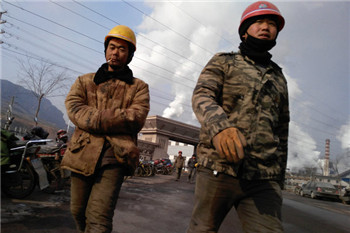
BEIJING — The failure of Chinese leaders to tackle the problem of excess industrial production has intensified an economic slowdown in the country and threatens to wreak havoc on global markets, a prominent European business association said in a new report on Monday.
一个重要的欧洲企业协会在周一发布报告指出,由于中国领导人无法有效对付工业生产过剩这个难题,从而加剧了该国经济放缓的程度,也可能由此引发全球市场的动荡。
Warning that the effects of overcapacity had become “ever more destructive,” the report by the European Union Chamber of Commerce in China blamed government policies and recalcitrant officials for inefficiencies across many of China’s major industries, including steel, cement and chemicals.
中国欧盟商会(European Union Chamber of Commerce in China)发表的这篇报告警告,产能过剩造成的影响已“恶化”,并将中国许多主要产业缺乏效率这一现象,归咎于政府政策与不愿配合上级的地方官员。这些主要产业包括了钢铁、水泥、化工等等。
“Without a sustained effort to address it now, overcapacity may well seriously impede the effectiveness of China’s economic reform agenda,” said Joerg Wuttke, president of the chamber. He said ineffective policies and parochialism among provincial officials had exacerbated the problem.
中国欧盟商会主席伍德克(Joerg Wuttke)表示:“如果不能有效解决,产能过剩将会严重阻碍中国经济改革进程。”他也表示,不良政策与地方官员的狭隘心态使得问题更趋严重。
China has for decades grappled with overcapacity, which occurs when demand for a product falls below what an industry is capable of producing. But the problem has worsened significantly in recent years, as the government has pumped capital into heavy industries like shipbuilding and glassmaking, even as global demand has fallen.
产能过剩已纠缠中国数十年之久,而过剩之所以会发生,是因为对某项产品的需求量,小于该产业所能提供的产量。而这个问题在近年来大幅恶化,因为即便全球市场需求已经下降,中国政府仍对造船、玻璃制造等重工业投入了大量资本。
Demand for steel, for example, has weakened in recent years. But the production of steel in China has continued to rise, surpassing the combined output of India, Japan, Russia and the United States, according to the report, titled “Overcapacity in China: An Impediment to the Party’s Reform Agenda.”
这篇名为《中国的产能过剩如何阻碍党的改革进程》的报告举例说明,近年来市场对钢铁的需求已经降低,不过中国的钢铁产量仍持续攀升,超越了印度、日本、俄罗斯、美国这四国的钢铁产量总合。
The issue of overcapacity has exacerbated trade tensions, as Chinese producers have sought to export surpluses. Several foreign governments, including the United States, have imposed tariffs on some Chinese steel products, and European steelworkers have protested the import of cheap Chinese steel.
产能过剩这一问题加剧了贸易紧张的局面,因为中国生产者已开始寻求对外输出他们过剩的产品。包括美国在内的多国政府都对一些中国钢铁产品课以关税,而欧洲的钢铁从业人员则对进口廉价中国钢铁一事进行了抗议。
“Trade frictions hamper supply chains,” the report said. “This poses a major threat to the positive effects of globalization.”
“贸易摩擦对供应链造成了束缚,”该报告称。“严重威胁了全球化的积极作用。”
Chinese officials have in turn criticized the protests in Europe, saying that overcapacity is a global problem and that the Chinese government is working to restructure the steel industry. Chinese officials have pledged to cut production in several industries plagued by overcapacity.
中国官员则对欧洲的抗议事件加以抨击。他们表示,产能过剩是全球性问题,而中国政府正在重建钢铁工业的秩序。中国官员已誓言要降低为产能过剩问题所困扰的数个行业的产量。
As China’s economy slows after more than two decades of breakneck growth, government leaders are facing increasing pressure to find ways to expand the service sector, increase consumer spending and shift resources away from traditional industries.
中国经济在历经二十多年的高速成长之后开始放缓。其政府领导人正面临与日具增的压力,需要找出方法来扩大服务产业、增加消费者的支出,并将资源移出传统工业。
Their efforts to overhaul the economy have been hampered by protectionism among local officials, who worry that closing factories will result in the loss of important sources of tax revenue.
然而他们想要整顿经济的努力,遭到了来自地方官员的保护主义的阻碍。这些地方官员担心,关闭工厂会导致他们失去重要的税收来源。
In its report, the European Union Chamber of Commerce in China offered several suggestions to Chinese leaders, including cutting capital expenditures in some industries and imposing a value-added tax to offer local governments alternative sources of revenue.
中国欧盟商会在这份报告中向中国领导人提出数项建议,包括了削减对某些行业的资本支出,以及用推动增值税的方式为地方政府开辟其他的税收渠道。












